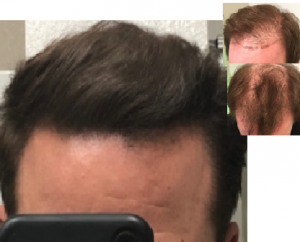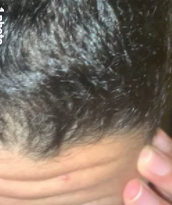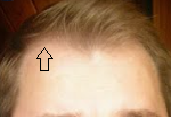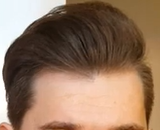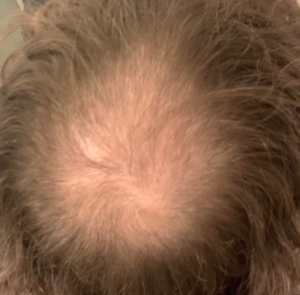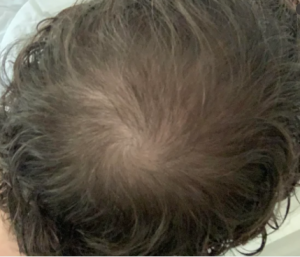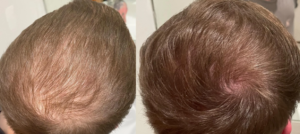https://www.ncbi.nlm.nih.gov/pmc/articles/PMC5028441/
Normally how long does it take for the anti-androgens to push all the telogen hairs out and replace them with anagen hairs with a bigger diameter, thicker, denser, which is what the increased shedding phase boils down to being afraid. My mother’s a dermatologist and told me to wait for 6 weeks for it to stop and if it takes longer than that and the shedding doesn’t stop then it’s abnormal and I should try another drug
Ignore the shedding with finasteride because it eventually goes away and the benefits then come on. Sometimes the shedding is not shedding but a rapid genetic hair loss being expressed and in that situation drugs like finasteride work to slow or stop the loss
So over Christmas break, I was on supplements called chromium and alpha lipoic acid on large doses. Both are known to cause hair loss. I came home, got a haircut, hair looked fine. Then i took these supplements and i noticed hair falling out. Like i could grab lose hairs of my head and hair came off into my hand in the shower, maybe like 10 or 15 strands. Finally a month later i connected the dots and stopped the supplements and the shedding soon stopped. Thing is, I got the exact same haircut again from the exact same person, and I feel like there’s less hair around my temples and more of my forehead is showing. Like It caused thinning in that short amount of time. Thoughts?
Generally hair loss takes time but your detecting it might be in a day when you look at yourself and stop denying what you have been seeing for sometime. Most people just don’t notice it until it passes a threshold. A doctor in Denver 30 years ago, pulled out 50% of the hair on one side of a black haired, white skinned man. He couldn’t tell which side was 50% with photos or independent observers. That tells you that you can lose a lot of hair without seeing it. That is why I perform HAIRCHECK tests to measure what can’t be seen. Hair loss rarely happens overnight.
You don’t lose your hair overnight, but you recognize it after you stop denying that you are losing your hair and that can be instantaneous.
Dr. Robert Haber had a 67 y/o female patient for two years and she was taking 0.625mg minoxidil/day. She was in a minor fender bender accident with no evident physical damage or harm from the accident and no airbag deployment. She developed chest pain and in the Emergency Room after an extensive examination demonstrated that she has a pericardial effusion (‘water around the heart in the heart sac’). The doctors did not connect the accident and the cardiac problem identified, but knowing that oral minoxidil can produce this complication, her minoxidil was immediately stopped. Slowly the effusion subsided. This is a warning that a is known complication of minoxidil on higher doses. It was previously thought that doses 2.5 mg or less per day was safe from this complication. This may not be the case even at doses under 1mg/day. This is a risk everyone taking minoxidil should know about.
Now with that said, it is possible that this patient could have had Covid which is known to cause pericardial effusion. Even the vaccine has, in rare cases, caused pericardial effusion so maybe, just maybe the pericardial effusion was from another cause other than minoxidil. Here is an article that suggests a connection with Covid and pericardial effusion: https://www.statnews.com/2021/06/10/officials-higher-than-expected-heart-inflammation-cases-covid-19-vaccination/
If you’re using min it is an oil or propylene glycol based substance that you are putting on your scalp twice a day, you need to be rinsing that off with some kind of detergent to get rid of that additional oil deposits. Minoxidil can also be incredibly drying so you need to maintain the moisture of your hair so that it doesn’t become dry or brittle or unhealthy. My suggestion for you would be to come off of the minoxidil and start with a shampoo conditioner leave-in conditioning treatment and see if you can’t get your scalp and hair back to a natural healthy state. You must use shampoo and conditioner every time you wash your head. A minimum of two times a week
I am thinking of getting a hair transplant. Unfortunately I have chronic folliculitis on the back and sides of my scalp. It comes and goes in intensity. Nothing on the top of my head. Does this disqualify me automatically?
I would have to examine you, possibly even biopsy your scalp where the folliculitis is. Did you get a diagnosis? If so is it called Folliculitis Decalvans? If so, then you would not be a candidate for a hair transplant. I clearly need to know more.
I’ve seen a lot of your messages on reddit being very helpful for people combating baldness. If you have a moment I hope you could help me with a small question. In my mid 20’s I noticed my hairline begin to recede and went on Finastride. It seemed to work great. My hair recession slowed down significantly. However, when I turned 34. I began to notice my hair line was receding again. I’m aware that drugs like Finasride, more or less, just slow the process down. But I was alarmed at how quickly my hair seemed to be receding all of a sudden. It was like the drug simply stopped working. I panicked and with some research I found that Dutasteride was an alternative that’s been shown to be slightly more affective. So I switched, from 5MG of Fin(quartered) to 0.5 of Dutasteride. That was approximately 10 months ago and my hair continues to recede and thin, at what feels like an alarming pace. So here is my question. Have I made a huge mistake in switching? Will I lose all the hair that I kept on Finastride even though I’ve switched to Dutasteride? I thought that if Dutasteride worked it would keep the hair that Fin was holding back. Or perhaps there was no slowing these effects any longer, whether it was Dut or Fin? I don’t know what to do. Thank you for your time.
A hair transplant is a better option. Dutasteride will probably not reverse this problem at your age and with your history with finasteride.
If you developed arm and chest hair with minoxidil and not scalp hair, that means that you are either taking it orally or absorbing a lot of the medication through your skin. I gather it is not working on your scalp hair?
I’ve seen a lot of your messages on reddit being very helpful for people combating baldness. If you have a moment I hope you could help me with a small question. In my mid 20’s I noticed my hairline begin to recede and went on Finastride. It seemed to work great. My hair recession slowed down significantly. However, when I turned 34. I began to notice my hair line was receding again. I’m aware that drugs like Finasride, more or less, just slow the process down. But I was alarmed at how quickly my hair seemed to be receding all of a sudden. It was like the drug simply stopped working. I panicked and with some research I found that Dutasteride was an alternative that’s been shown to be slightly more affective. So I switched, from 5MG of Fin(quartered) to 0.5 of Dutasteride. That was approximately 10 months ago and my hair continues to recede and thin, at what feels like an alarming pace.
So here is my question. Have I made a huge mistake in switching? Will I lose all the hair that I kept on Finastride even though I’ve switched to Dutasteride? I thought that if Dutasteride worked it would keep the hair that Fin was holding back. Or perhaps there was no slowing these effects any longer, whether it was Dut or Fin? I don’t know what to do.
Dutasteride and finasteride can be interchanged without negative effects. What you are describing is the inevitable changes in progressive hair loss and I doubt with the history you gave, that any medication will help you at this stage. If your hairline bothers you, a hair transplants is the only option.
Since they kept on growing for a month after the hair transplant, before the shedding period started, that should mean the grafts survived well, doesn’t it? If it is this way, then I know I have nothing to worry about, but I can’t seem to find any information to confirm this.
The normal state for grafts is that they appear to grow immediately after a hair transplant but are not actually growing because what looks like growth is really the body pushing out the hair from the grafts to their full length, usually between 5-8 mm plus the length of the hair above the skin at the time it was taken. So the apparent length depends on how long the surgeon kept your hair length when he did the FUE. After they shed, they restart growth in sometime between 2-4 months after the shed.

